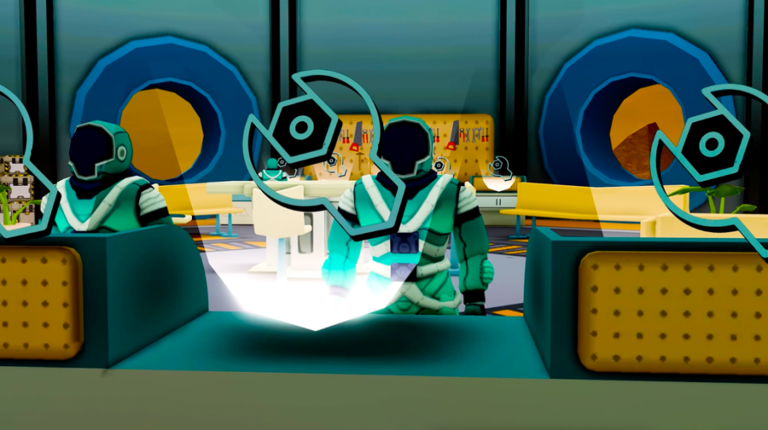7 Ways Video Games Can Improve Your Child’s Time Management (and how you can help)
We all have 24 hours in our day. 24 hours to spend on work, school, and sleep. 24 hours to cook, clean, and still leave time for your favorite show. And most days, those 24 hours fly by while your checklist just gets longer.
And it’s the same for our kids.
With the right time management skills, you and your child can ditch the overwhelm and check off those daily tasks. But time management skills take practice to master.
And that’s the first obstacle — how can you help your child practice staying on task when they have no interest in that task? How do you help them manage their time to complete a project when the project doesn’t matter to them? Does your child have executive function challenges, or do they simply not care enough to perform well?
These are tricky questions to answer. But either way, your child needs to practice their executive function skills. Time management, problem-solving, and organizational skills are required to thrive in today’s fast-paced, online world.
So how can you help your child improve these skills? Take the practice to where they already spend their time — video games!
What is executive function?
Executive function is the collection of skills needed to think through problems, manage time, and accomplish goals. And in today’s society, it’s easy to see why executive function skills are highly valued. If these skills are lacking, they can make daily life — especially work and school tasks — incredibly difficult.
Which executive function skills should my child have?
We want our kids to eventually develop a full executive function skill set. But they don’t all appear at one time. Executive function corresponds with brain development (particularly the frontal lobe), so a lot of these skills will continue to develop throughout adolescence and early adulthood.
Knowing these skills take years to fully develop can help you manage your expectations. Young kids, and even teenagers, are not meant to have the same ability to focus as adults. But not everyone in your child’s life will be so understanding of their developing skills. And doing well in school often requires a lot of executive functioning that many kids are still working on.
Some important executive function skills include:
- Complex problem solving
- Adaptability
- Strategic planning
- Organization
- Goal Setting
- Emotional regulation
- Attention and focus
- Time management
Looking at this list, you likely see a few things your child can work on. And if I had to guess, there are probably several skills listed you’d like to work on yourself. Many of us would love to get more organized, improve our focus, and better manage our time. These are tricky skills to master, even for adults. But we can all get there with the right practice.
Why should kids practice time management skills?
All of us have to manage our time. As an adult, and especially a parent, there are loads of tasks to complete on any given day. Somehow we’re supposed to find time to respond to work emails, check in with friends and family, prepare meals, clean the house, exercise, and care for children. And that’s not even half of a typical parent’s daily tasks.
Your child has many things on their to-do lists as well — from studying to hanging with friends — that they have a limited amount of time to get done. And even though some of their tasks don’t seem all that important to us, they’re very important to them. And finding time to play through their newest video game with their best friend can make or break their day.
Now, we’re firm believers in setting realistic expectations as well. No matter what you do, you can’t add more time to your day. And the stress of incomplete tasks can weigh on you, affecting your mental health and overall ability to function. That’s where time management skills like goal setting and prioritizing come in. With the right time management skills, you and your child can check off those boxes and relax.
There are loads of hacks, tips, apps, and tricks out there to help you manage your time. But the best way to improve any skill is by practicing it. And that’s where video games really step up. With the right games, your child can improve this important executive function skill and take back their day.
7 time management skills your child can practice in video games
Video games come in a huge variety of types and styles. But most games involve some (if not all) of the skills below, each of which is an integral part of time management.
1. Goal Setting
Being able to identify short-term and long-term goals is a crucial first step to managing your time. When you know your goals, you can better plan and prioritize your upcoming tasks. And in many video games, especially role-playing games, goals are front and center.
Video games usually come with an ultimate goal — and if your child accomplishes this, then they’ve beaten the game. But almost all video games also include many smaller goals (or side quests) along the way.
What do goals in video games look like?
- In Roblox’s Risk Universalis, the goal is to control as much territory as possible (just like the classic Risk board game). This requires extensive, long-term planning as players carry out their expansion plans.
- In Assassin’s Creed Odyssey, players work through the story to solve the mystery of the Cult of Kosmos and rediscover their family. But this larger goal cannot be accomplished without a lot of gameplay and side missions to help level up your character.
- In Super Mario, your goal is to save Princess Peach from the evil Bowser. And you do that by working your way through each level, growing in skill as you progress.
But you’ll also find many players setting personal goals for themselves — such as leveling up a character to reach a special ability they want or accumulating a game currency to buy the coolest gamer skin.
And this is amazing! Your child, the same one who loses focus and motivation during every school project, may start setting elaborate game goals, tracking their progress over weeks or months. And when they reach their goal, their excitement is contagious. So give your kid a big congrats and high five. Even though they may not be setting the same goals you would set for them, they’re still learning an incredibly valuable skill.
2. Creating To-Do Lists
It’s impossible to manage your time if you don’t know what you need to do. And it’s hard to see a path to a goal if you don’t break it into smaller steps. To-do lists help you organize your day and your goals. And yes, video games use them too!
Video games use to-do lists in a variety of ways, but they are most often found on the player’s dashboard. The dashboard likely holds many different types of to-do lists.
- One list breaks down the game’s story into a series of tasks — checking them off for the player as they progress through the game.
- The dashboard can also present unique, optional achievements the player can choose to tackle if their goal is 100% game completion.
- Is your child working towards a special item? If the item is built from other game resources, the dashboard can keep track of the player’s progress in collecting the resources needed to create the new item.
In video games, players see how complicated tasks break down into steps, learn why the order of those steps matters, and feel the satisfaction of checking them off as they complete them. And that’s a huge time management win.
3. Prioritizing Tasks
Deciding what’s important and time-sensitive (and what’s not) is a skill many people are looking to improve. It’s hard to manage a daily to-do list of 17 tasks. But when you take a closer look, maybe only 6 really need to be completed today. And that brings the overwhelm down in a hurry, making it easier to get started and stay the course.
Video games model how to prioritize tasks. Players experience what happens when high-priority tasks are ignored. If you have to save a character within a certain amount of time, but you choose to run around collecting coins instead, then you miss your opportunity. You’re left to start over from your last save point, with none of the coins previously collected. But a much clearer idea of your priorities.
And video games also help players learn the importance of prioritizing based on their goals. If their primary goal is to complete the story to access co-op play, then running around completing side missions is going to delay them reaching their goal. But if their friend’s goal is to pick up an item only found in a handful of side quests, then side missions are crucial.
4. Starting Small
Smaller, short-term goals are, by design, easier to achieve. The path is often already laid out ahead of you. All you have to do is follow the steps. But big, long-term goals are a different story.
When you have big dreams, you may not see a clear path to your goal. It can feel impossible to reach. But anything is possible when you start small. And video games help players see how to build skills over time to accomplish a larger goal.
In the Roblox game Vesteria, players are encouraged to level up their attributes and skill points before joining a faction. They start small and slow, building an understanding of the basic game mechanics before determining their long-term role in the game.
This is nothing new. When you start any new video game, there are tutorials or small quests to help you learn the game and practice new skills. You don’t jump straight to the big, bad boss at the end. You take your time, amassing resources, experience, and confidence until you’re ready to take him on. And all of those steps are crucial to reaching your end goal, just like in real life.
5. Delegating Effectively
There are many games where delegating tasks is a helpful (or even necessary) way to complete a goal. Strategy and planning are essential in games like Call of Duty. In these games, a “divide and conquer” plan can make all the difference. This gives gamers a chance to identify their own strengths and weaknesses, then delegate the tasks accordingly.
Even younger players can practice the important skill of delegating inside video games. In the Roblox game My Kingdom, players work to expand their land and accumulate wealth. Once they earn enough, players can employ workers to help them grow. For example, a player may delegate the task of collecting timber to an employee while they work on higher-level tasks, such as resource allocation.
6. Identifying Time Wasters
This may feel like an odd one to have on this list. As a parent, it’s easy to view video game playing as an entire waste of time. But hopefully, by now, you see how video games can be a great way to build new skills — including identifying time wasters.
Most gamers have a goal in mind as they play. But, just like in the real world, it can be easy to get off track. And many video games provide ample distractions to try to keep you playing and engaged.
But as your child encounters these in-game distractions, they’ll begin to see them for what they are. If they come to you, frustrated at making little progress, you can help them review their gameplay that day. Did they spend all day running around completing minor side quests? Did they enjoy their time, or are they disappointed? These conversations can help guide them towards better ways to spend their online time and help them achieve their goals.
7. Using Breaks Wisely
In life, sometimes you need a break to plan your next step. Other times you need a break to rest, recharge, and reset. Your brain and body can only be productive for so long before you need to step back.
Video games are an excellent way to help your child learn when and how to take a break. Some games require taking turns, planning your in the downtime (often based on what the other players are doing). But other times, you just need to step away from a problem to solve it.
Frustrations will arise as your child plays (“rage quitting” is a common video game term for a reason). And because they really care and want to succeed, this can hit your gaming child pretty hard. But you can help them learn when to step back and rest. And when they need to stop and work their brains and bodies in a different way.
As they learn to step away, they’re practicing valuable regulation skills — something many of us are still working on ourselves. And this practice of listening to their body’s cues (as opposed to arbitrarily imposed limits) is an incredibly important component of learning this skill.
How you can help your gaming child learn better time management
At Kinjo, we believe in giving children autonomy in their learning. But that doesn’t mean we leave them to do it all on their own. Parents play an incredibly important role in helping their kids master these and other skills.
As seen above, video games can be a great place to practice time management skills. But connecting those skills back to the real world is crucial. Luckily, this isn’t hard — you just need to talk with your child.
By showing an interest in their gameplay, you can open so many conversations. You’ll start to see the skills they’re practicing. And you’ll better understand why they choose to spend so much time in these virtual worlds.
Here are a few conversations to help you connect with your child while reinforcing the time management skills they’re learning in video games.
- What are you trying to accomplish in this game? And what are your plans to get there?
- What makes this game hard? Which obstacles are blocking you from your goals?
- After you get that resource, what’s the next step?
- How does what you’re doing now help you beat the game/level up?
- Is anyone else helping you work towards your goal?
- Explain what you’re working on today. How does this game work? What are the rules?
- How does your body feel? Does your brain feel tired?
- Are you feeling frustrated? How can I help? What do you need?
- What did you accomplish today? Did you reach your goal?
- What are your plans for tomorrow?
These probably all feel a little stiff. We don’t recommend reciting them exactly as written — you won’t get very many responses. But once you take some time to learn about the games they’re playing, you can personalize these questions to keep them exciting.
Executive functioning skills don’t happen overnight
If these skills seem advanced for your 7 or 10-year-old, that’s because they are. Time management (and other executive functioning skills) will continue to develop throughout your child’s life, into their 20s and even their 30s. And even when the books say it’s developmentally appropriate, executive functioning still takes plenty of time and practice to master.
If you notice your child struggling with these skills, it doesn’t mean they always will. Take a deep breath, and then look for extra skills learning outside of the classroom — in video games or other activities they enjoy. And of course, don’t hesitate to talk to a medical professional if needed.
As you work with your child on these skills, remember to keep open communication. Video games are great for skills practice, but your young gamers still need you to help them navigate what they’re experiencing. By keeping up with your child’s online learning, you can help them translate the skills they’re practicing to use in other real-world pursuits.
Not sure where to start? If your child loves Roblox, download Kinjo — Play Smart and Earn to encourage and your reward your kids for playing games that help build skills – including executive function.
Visit the app store today to download Kinjo — Play Smart and Earn. And have a blast discovering the learning in Roblox!








